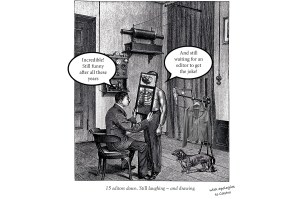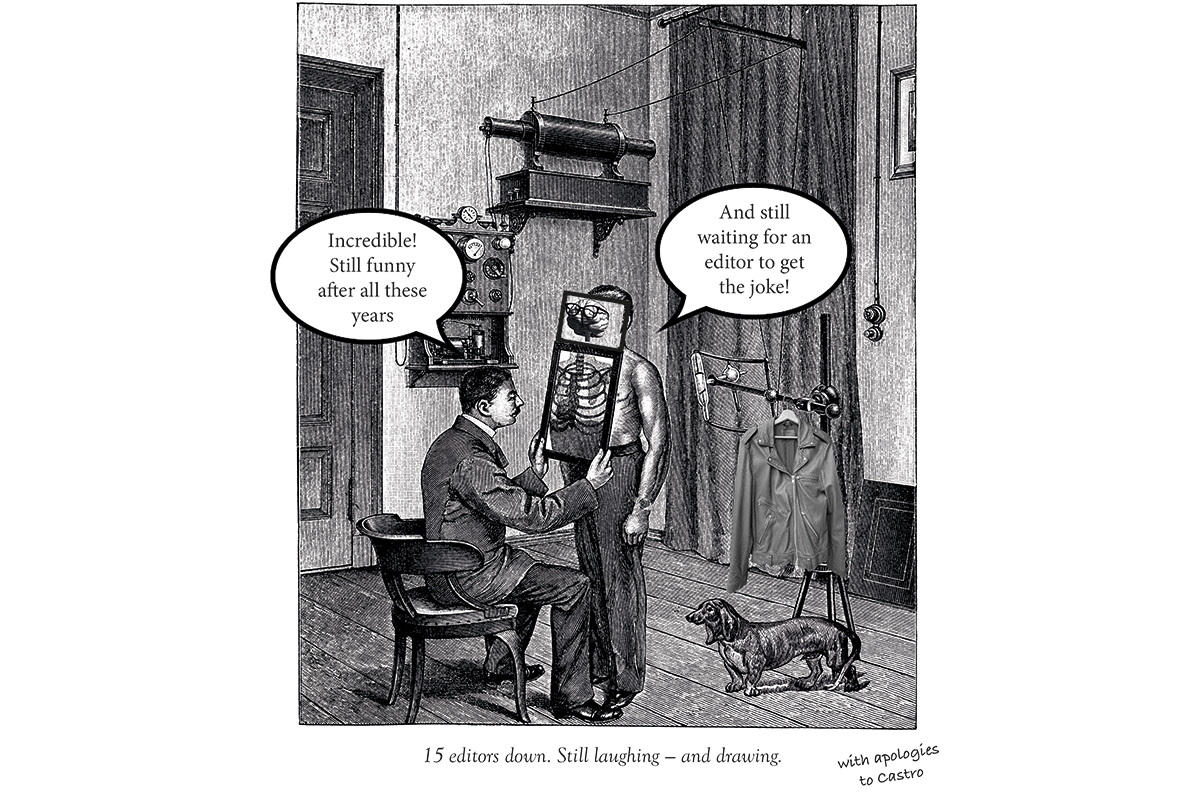They are getting themselves terribly worked up about that new 50 pence coin commemorating our departure from the European Union. By ‘they’ I mean those people in the Brexit Derangement Syndrome intensive care ward, wired up to saline drips, attended to day and night, occasionally afforded a few thousand volts of ECT when things get really bad, but still foaming, still beside themselves with apoplexy. Alastair Campbell has announced that he will not accept the coin if given it in change. Lord Adonis, who was perhaps already in the antechamber of derangement even before June 2016, said: ‘I am never using or accepting this coin.’ The writer for middle-class kiddies, Philip Pullman, our own pound shop C.S. Lewis, urged ‘literate’ people to boycott the coin because the inscription was missing an Oxford comma. A nod, there, to the central tenet of the Remoaner fringe these past four years that those who wanted Brexit were all thick. The thing about an Oxford comma, Phil, is that it is not needed. It is optional — go on, look it up.
All this over a 50p piece. Hell, I wasn’t wholly delighted when Jane Austen suddenly appeared on our £10 notes, given the misery I endured in school reading Pride and Prejudice. But I have managed to survive, and use those notes, without throwing the toys out of my pram, or weeping, or tearing my hair out.
Such epic petulance, such surly bigotry and spite. The repeated stamping of a tiny foot in a vast and empty auditorium. The little tranche of Remoaners — now morphing imperceptibly into Rejoiners — insisting that they will acquire Irish passports or saying they might leave the country altogether. This last little coterie may or may not include the journalist Yasmin Alibhai-Brown, who seemed to say she would leave the country if Boris Johnson became British prime minister. Whether she actually said this or not is moot. Either way, between us we must be able to think up a policy which would really persuade her to go. I’ll pay her taxi to the airport and give her some money for a snack on the way. A chicken wrap or something.
And yet these people are a tiny, if voluble, minority. The remarkable thing is that since December 13 the great national divide over Brexit seems to have mended almost completely. One of the most frequently expressed opinions these past three years of commentators from both sides — although especially from the Remainer side — is that the UK was sickeningly split into two warring tribes and that this would take a generation to repair. I never quite bought into this argument. There seemed to me to be a furious rump of Remoaners unable to accept a democratic decision and — well, the rest of us. The vast majority of those who voted Remain have long since accustomed themselves to us leaving — a point never really reflected in the mainstream media, which of course prefers dissent to accord and still thought the whole thing was up for debate.
As it happened, that cleft did not take a generation to heal — it took about two weeks. Since Boris Johnson’s remarkable victory, the fugue of complaint has been effectively silenced — except for on that lunatic wing. There is even a certain gung-ho optimism at large, and not simply from Brexiteers. Not a single one of those egregious Project Fear predictions has come true, not one. Inward investment stock in the UK was more in 2018 than in France and Germany combined, at almost £1.5 trillion ($1.95 million) — no. 1 in Europe. The UK’s economic growth is predicted to outperform the entire eurozone, with Germany — only recently sidestepping an official recession — heading towards stagnation. Unemployment is the lowest it has been for 45 years and the unemployment rate just a little more than half of that for the eurozone as a whole. Wages are at last rising. The pound is comparatively buoyant. Then there is this. Will Brexit render your home worthless, as the then-chancellor George Osborne kindly advised in 2016? Nope, quite the reverse. Since Brexit was assured by that general election victory in December, British house prices have risen at their fastest rate since 2002, according to the property website Rightmove.
If anything had dampened the property market prior to the election, it was an uncertainty about whether we were going to leave or not, which was solely a consequence of that rump of the defeated side not accepting the decision of the people and using every possible recourse to prevent it. A paralyzed parliament and a concomitant lack of direction was far more damaging to our country than a timely withdrawal from a bureaucratic institution riven by internal division and economically floundering would have been.
For three years, the provisional wing of the Remain movement used every possible recourse to thwart Brexit. This included, but was not confined to, the House of Lords, the law courts and the undermining of parliamentary protocol. They had on their side the judiciary, the BBC, our academics, the City of London and the CBI, the International Monetary Fund and of course the European Union. At every possible juncture we were informed that calamity awaited us. We were told that calamity would occur even if we simply voted for Brexit — never mind us actually going through with it.
And even when the calamities predicted in Osborne’s Treasury Report in the spring of 2016 notably failed to occur, there was not the slightest admission that Remain had got it terribly wrong — it was simply a case of calamity prorogued for a while. Meanwhile, David Cameron suggested that the jihadi maniacs of Isis were avidly pro-Leave and that we would be more likely to have an unpleasant war with someone — he didn’t say who — if we voted to leave the EU.
All of this petulant, alarmist gibberish — far more egregious than an erroneous slogan written on the side of a bus — accompanied us for three long years, from June 23, 2016 to December 13, 2019. A shrill screech of idiotic fury from people who did not like being gainsaid and thought they knew better than the rest of us. Because of course — pace Pullman — we were all thick. Those false jeremiads were far more damaging to our country than simply leaving the EU. And now, for the most part, they have gone silent.
There is still barking from the sidelines, of course. The provo Remainers now insist that calamity will come one day. That we will not be able to strike a trade deal with anyone without losing our soul. That we will not achieve a deal with the EU in time and that if we do it will be deleterious to our economy. They yearn, these people, for Britain’s failure, the more abject the better. In their recitals of foreboding, each one as baseless as the one before, they seem to be the kind of people who might have their cake, eat it, regurgitate it on to a plate, suck it up through a straw and then spit it out via Twitter. Most Remainers are optimistic that we will succeed, much as you might expect. They may wish we were not leaving, but they do not wish us to fail as a consequence.
We have the EU to deal with, of course, and the usual saber-rattling from the likes of Michel Barnier; an indication, I think, of the sheer terror within the 27 that Brexit actually may make us better off after all, and what effect that might have on the disaffected countries still within. And oily Leo Varadkar has announced, with spite, that the UK must get used to being a ‘small country’. Not as small, literally or metaphorically, as yours, mate. Meanwhile we get on with it, stable and thriving, hugely grateful that we trusted not in the establishment, but in democracy.
This article was originally published in The Spectator’s UK magazine. Subscribe to the US edition here.


























